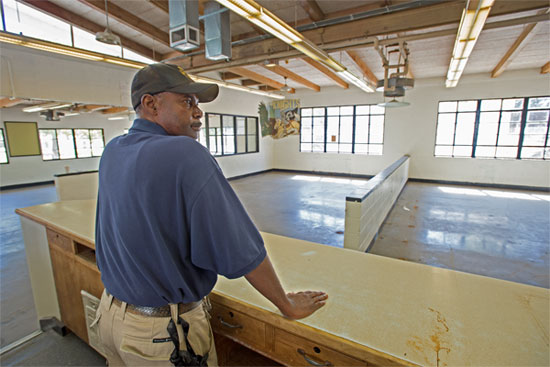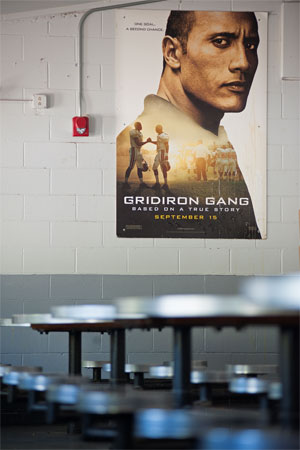From boot camp to home base
September 11, 2014

A probation official at the old central command center, where the camp's open dorms were supervised.
When bulldozers rumble into Camp Vernon Kilpatrick in Malibu, they will not only demolish an obsolete juvenile corrections facility but make way for an innovative approach to rehabilitating delinquent youths.
The Los Angeles County Probation Department is turning away from traditional methods that focused on control and punishment. Instead, it’s gradually adopting a model that emphasizes mentoring and a sense of community.
“It’s about building relationships and trust,” said Sean Porter, a director with the department’s Residential Treatment Services Bureau.
“There’s a saying: (the youths) won’t care what we think until they think we care about them,” Porter added. “The more time we spend with the youths, and convey compassion and genuine interest in them, the more they’ll listen to us.”
On Friday, probation officials, along with Supervisor Zev Yaroslavsky, will hold a ceremony to kick off the demolition of Camp Kilpatrick’s aging dormitories, classrooms and gym —only the kitchen and pool will be left intact — while plans for a modern facility are finalized. The project’s completion date is still to be determined.
Originally built as a barracks in 1962, Camp Kilpatrick had an institutional configuration, with bunk beds arranged in rows against cinderblock walls, exposed showers and toilets, and spaces designated for solitary confinement.
It was essentially a boot camp, and Porter believes such an approach tends to produce only short-term benefits
“It’s temporary,” he said. “Unless you change the way the youths think, you’re not going to change the way they behave.”
Probation Chief Jerry Powers is determined to reform the system by emulating some of the techniques used by Missouri’s Division of Youth Services.
The so-called Missouri Model puts youths in small groups with a more home-like—as opposed to jail-like—environment, supervised closely by supportive probation officers, social workers, teachers, psychologists and other professionals.
The approach has dramatically lowered juvenile recidivism rates in Missouri, and jurisdictions in New York, New Mexico, Washington D.C. and California’s Santa Clara County have created their own versions of it.
Powers’ $48-million vision for Camp Kilpatrick calls for tearing down the dilapidated dormitories and building cottages for “core groups” of 8-12 youths.
They would attend classes, eat meals, and engage in counseling sessions and other activities together. The cottages would be furnished with comfortable beds and other amenities, and have lots of natural light and fresh air.
In addition, there would be an on-site doctor’s clinic, daily nursing services and extended mental health clinician coverage—all unique to the Los Angeles Model.
Powers said the goal is to help the youths feel secure, while developing a sense of responsibility, accountability and community.
“Aligning the new facility with new treatment and educational approaches will translate to reduced recidivism, increased academic achievement, and better employment opportunities,” he wrote in a letter to the Board of Supervisors in May.
To date, the board has approved a $41-million budget for the project, about three-quarters of which has been raised through state grants.
Angela Chung, a policy associate with the nonprofit advocacy group Children’s Defense Fund, is excited about the proposed changes.
“I think this is a chance for Los Angeles to be ahead of the curve and move toward a more healing model,” she said.
Porter said if core groups are like a sports team—with their probation officer acting as their coach—Camp Kilpatrick already has a track record of success.
Its winning football team inspired the movie Gridiron Gang, with Porter portrayed by actor/wrestler Dwayne “The Rock” Johnson. Its basketball team almost won a regional championship, while the soccer program has produced a league MVP.
“We’ve used sports to teach self-discipline and the value of hard work, and to develop self-esteem,” Porter said.
“When the youths walked out of the camp and back into their communities, their shoulders weren’t slumped down and their head wasn’t hanging because they were able to accomplish something, and they knew they could do more.”

The vacant Camp Kilpatrick will be razed and replaced with a modern facility and a change of philosophy.
Posted 9/11/14













 405 bridge work causes a stink
405 bridge work causes a stink
